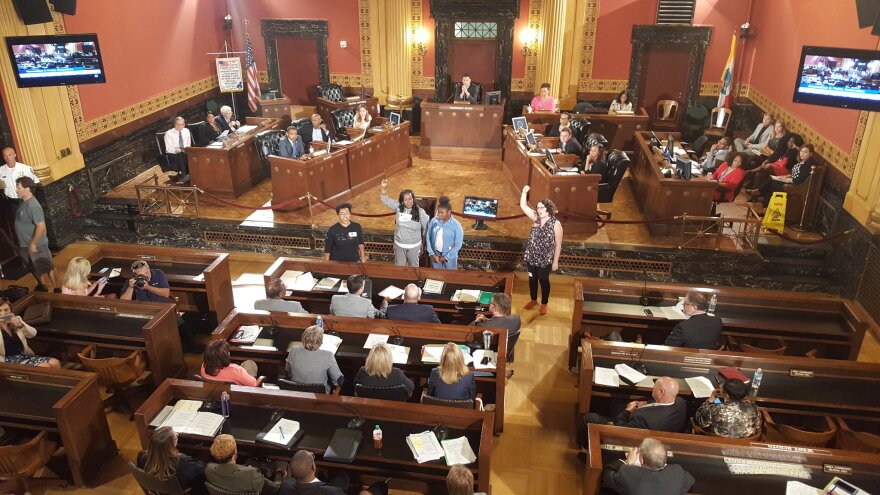Last week, Liliana Baiman walked into Columbus City Hall with her infant son Dylan propped on her hip. Will Petrick from the group Yes We Can helped her fill out a speaker’s slip, making sure to get it timestamped before she slid it into a wooden box.
Columbus City Council is wrestling with something it has never done before: campaign finance reform. But its loudest critics don’t oppose restrictions; rather, they say Council members aren’t going far enough.
People like Baiman generally applaud the measure’s disclosure requirements, but they’re balking at a nearly $13,000 annual cap on contributions. It's a far higher limit than any other city in Ohio.
“I’d like for the playing field to be leveled out,” Baiman says, “for our contributions of $25 or $50 to make as much impact as someone who could potentially donate $12,000 or more.”
The measure would apply to any municipal candidate, including mayor, council member, auditor and city attorney. It borrows the state’s number for contributions—originally $10,000, adjusted for inflation every two years. That’s how you wind up with the current limit: $12,707.79. It’ll be adjusted again at the end of February.
But Catherine Turcer, from the government watchdog group Common Cause, says there’s a catch. At the state level, the limit applies to campaign periods: the time before a primary election and the time between the primary and the general elections.
“For the city council, it’s per year,” she explains. “And so you may say, 'Wait a minute, isn’t that the exact same thing? Well no, it’s not.'”
City officials serve four-year terms, which gives them the opportunity to receive the maximum contribution four times. A state official serving a four-year term only has two chances.
Turcer applauds efforts to reveal the source of money used for campaign ads, and she’s particularly impressed with the Council's inclusion of a tax credit to encourage small donations. Still, she says, the ceiling is high enough that it’s almost meaningless.
“In other words, they established a limit, because right now the limit is 'the sky’s the limit,'” she says. “But it doesn’t actually limit their contributions in any meaningful way.”
In his first mayoral bid, Mayor Andrew Ginther received a handful of donations worth more than $10,000 from unions, corporate PACs, and a couple of local developers. Notably, Frank Kass from Continental Real Estate gave $50,000 in less than a week.
But most contributions are in sums of $10,000 or less. Ginther raised about half a million dollars last year through nearly 300 individual donations. Under the current proposal, he’d only have to turn down one of them.
Outgoing Council member Michael Stinziano defends the city’s decision to use the state figure. He says caps used in other cities are arbitrary, and the lower they go, the better chance there is for outside money to flood into a race.
“There’s some members on Council that don’t think we need any number, that again, disclosure’s all that’s important, continue, the system isn’t broken, what are we trying to fix?” Stinziano says. “There’s some members that think it could be lower, and so landing at this spot was something that we could tie it to, attribute and understand. It’s something that’s been in place that’s worked in other campaigns across the state.”
In December, Stinziano pulled the plug on a planned vote for the measure, in order to allow for more public discussion. He says Council didn’t want to rush, but they are working on a deadline.
“What is important, though, is that we want something in place before this year’s municipal elections,” Stinziano says. “I think it’s important that if we’re going to do this reform that it’s going to be applied as quickly as possible.”
To have contribution limits in place for this year’s elections, Stinziano says they’ll need to pass an ordinance by about the end of the month.
Meanwhile, campaign season marches on. Mayor Ginther hosts his first reelection fundraiser of the year next week.






